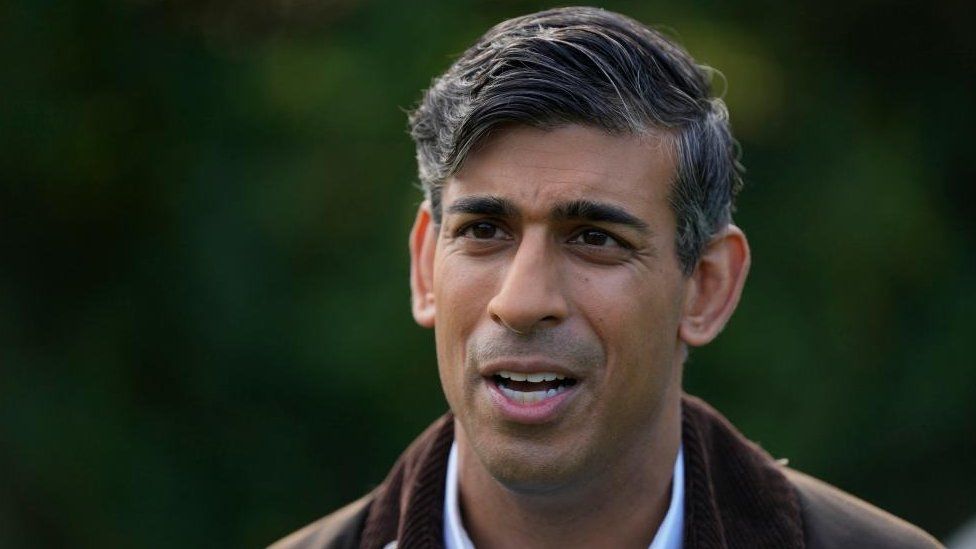ARTICLE AD BOX
 Image source, PA Media
Image source, PA Media
Rishi Sunak says he wants to stop "hare-brained" road calming and safety schemes, including 20mph zones, to end what he said was a "war on motorists".
The prime minister said that he wanted to ensure such measures would no longer be "forced" on drivers.
There would also be a review of Low Traffic Neighbourhoods, or LTNs, in England to ensure they are not introduced without local support.
The shadow transport secretary said the plans were "pure hypocrisy".
The government said it was publishing a "new long-term plan" to "put the brakes on anti-car measures".
It would also look at preventing the introduction on the concept of the "15-minute city" - where essential amenities are always within a 15-minute walk.
It comes weeks after the PM delayed the introduction of a ban on the sale of new petrol and diesel cars.
'War on motorists'
In an interview with the Sun, Mr Sunak he was "slamming the brakes on the war on motorists, it's as simple as that.
"We want to do now is make sure that all these hare-brained schemes that are forced on local communities, whether its Low Traffic Neighbourhoods, blanket 20mph speed limits, all of that, we need to stop.
"We want to make sure they are not having these schemes imposed on them, forced upon them."
He conceded 20mph zones near schools "make sense" but said they should not be done in a "blanket way" elsewhere.
LTNs reduce traffic in residential streets, and improve access for pedestrians and cyclists with dedicated lanes, wider pavements and planters blocking off vehicle access.
Speed limits of 20mph are designed to reduce the severity of injuries suffered in accidents.
Writing on X, formerly known as Twitter, Louise Haigh, the shadow transport secretary, posted previous commitments by the Conservatives to LTNs, adding: "Whose hare-brained idea was it in the first place?".
"It's pure hypocrisy to see Rishi Sunak denounce a policy the Tories have been instrumental in delivering. The only dividing line he has is with his own government."
Responding to early reports of the new plan, the chief executives of Bikeability Trust, British Cycling, Cycling UK, Living Streets, Ramblers and Sustrans said the government was "entrenching congestion and reliance on driving for short local journeys.
"This is a plan that looks no further than one way of travelling and will make the roads worse for those occasions when people do need to drive."
An LTN in Bath, which reduces access for vehicles
The implementation of schemes such as LTNS and 20mph zones is the responsibility of local authorities. However, the government said its plan would:
- Review guidance on 20mph speed limits in England, to prevent their use in "areas where it's not appropriate"
- "Amend guidance" on LTNs "to focus on local consent", and weigh public support for those already introduced
- Stop councils implementing "15-minute cities" by consulting on ways to prevent schemes which aggressively restrict where people can drive
The plan would also seek to reduce the hours where cars are banned from bus lanes, and target "overzealous" enforcement of parking.
The government took aim at overrunning and disruptive street repairs, saying it would "consult on extending fines for repairs which run into weekends and increasing current levels of fixed penalty notices".
Mr Sunak said: "For too long politicians have focused on the short-term decisions with little regard for the long term impact on hardworking families.
"We've seen this consistently with people's freedoms on transport."
He claimed the "clamp down on drivers" was "an attack on the day-to-day lives of most people... who rely on cars to get to work or see their families".
"We are taking the necessary decision to back the motorists who keep our country moving."
Mr Sunak said the decision by the Labour-run Welsh government to drop the default speed limit from 30mph to 20mph for restricted roads was "not right" and his government would take a "different approach".
The Welsh government predicts its change to 20mph will save up to 100 lives and 20,000 casualties in the first decade.
The announcement follows the prime minister's revision of his government's net zero policies, which pushes out the ban on new diesel and petrol cars from 2030 to 2035.
The move provoked a backlash, with the Climate Change Committee - the government's independent advisers on cutting carbon emissions - saying the UK had "moved backwards".
It also follows the Conservative Party's narrow byelection victory in Uxbridge, Boris Johnson's former seat, after fighting a campaign focused on local opposition to the expansion of London's ultra-low emission zone which takes old and high-polluting vehicles off the road.

 1 year ago
18
1 year ago
18








 English (US)
English (US)